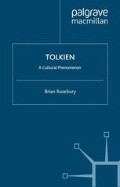Abstract
Much depends, of course, on what precisely Tolkien’s work is earnest about. In the three sections of this chapter, which examines Tolkien as a thinker, and a figure in the history of ideas, I want to consider how his writing responds to its time; to examine and evaluate some applications, or appropriations, of his work for particular ideological purposes; and to show that there is an underlying coherence in his thought.
Access this chapter
Tax calculation will be finalised at checkout
Purchases are for personal use only
Preview
Unable to display preview. Download preview PDF.
Notes
C. Wilson, The Strength to Dream (Gollancz, 1962), p. 150n. Dodsworth claims that The Lord of the Rings is ‘a shamefully self-glorifying account of how little England defeated the ogre Hitler’ (in P. Rogers (ed.),An Outline of English Litemture (Oxford University Press, 1998), p. 405.)
J. R.Watson, ‘The Hobbits and the Critics’ Critical Quarterly, XIII, 3(1971) p. 258.
N. Otty, ‘The Structuralist’s Guide to Middle-earth’ in R. Giddings (ed.), This Far Land (Vision Press, 1983), pp. 166, 172.
John Ruskin, ‘Pre-Raphaelitism’ The CompleteWorks of John Ruskin (Bryan,Taylor & Co., 1894), XV, p. 237.
Freud, Civilization and its Discontents (1930), tr. J. Strachey (W. W. Norton Co, 1962); Marx, ‘Excerpts from James Mill’s Elements of Poltitical Economy’ (1844 ms) in L. Colletti (ed.), Karl Marx: Ear1y Writings, trans. by R. Livingstone and G. Benton (Penguin, 1975), pp. 277–8.
E. Fischer, How to Read Karl Marx (Monthly Review Press, 1996), p. 54.
Or so at least I interpret Marx’s view. See David McLellan, The Thought of Karl Marx (Macmillan Press, 1971), pp. 138–50 for some relevant passages.
J. Pearce, Tolkien: Man and Myth (HarperCollins, 1997).
Charles A. Coulombe, unpublished ms., quoted in Pearce, p. 160. Coulombe’s essay subsequently appeared as ‘The Lord of the Rings: A CatholicView’ in J. Pearce (ed.),Tolkien:A Celebration (Ignatius Press, 2001),
T. A. Olszariski, translated by Agnieszka Sylwanowicz, ‘Evil and the Evil One in Tolkien’sTheology’ in P. Reynolds and G. GoodKnight (eds.), Proceedings of the J. R. R. Tolkien Centenary Conference (Mythopoeic Press, 1995), pp. 298–300; C. Garbowski, ‘Eucatastrophe and the Gift of Iluvatar in Middle-earth’ Mallorn XXXV (1997), pp. 21–7.
C. Garbowski, Recovery and Transcendence for the Contemporary Mythmaker (Marie CurieSklodowska University Press, Lublin, 2000), pp. 180–1.
P. Curry, ‘Tolkien and His Critics; A Critique’ inThomas Honegger (ed.), Root and Branch: Approaches Towards Understanding Tolkien (Walking Tree Publishers, 1999), pp. 94–5. Aryk Nusbacher, whose contributions I have found the most valuable part of the Cromwell Productions/EagleVision videotape J. R. R.Tolkien: Master of the Rings (2001), argues persuasively that the tensions among the benign peoples reflectTolkien’s awareness of the frictions of’coalition politics’ in the 1930s and 1940s, and the need to overcome them.
P. Curry, Defending Middle-earth:Tolkien, Myth and Modernity (HarperCollins, 1997).
Curry, p. 142, quoting Brian Attebery, Strategies of Fantasy (University of Indiana Press, 1992).
See L.Tolstoy, The Kingdom of God isWithinYou, trans. by Constance Garnett (University of Nebraska Press, 1983), passim. I am indebted here to T. Hopton, ‘Tolstoy, God and Anarchism’ Anarchist Studies 8 (2000), pp. 27–52.
Thomas Hobbes, Leviathan, Part II, chapter 31, ‘Of the Kingdome of God by Nature’ ed. R. Tuck (Cambridge University Press, 1996), pp. 246–8.
This sentence seems to me to undermine the less illiberal reading of the ‘Job’ passage offered by Alan Ryan, ‘Hobbes and Individualism’ in G. A. J. Rogers and A. Ryan (eds.) Perspectives on Thomas Hobbes (Clarendon Press, 1988), pp. 94–7. According to Ryan, Hobbes is concerned here to emphasise the difference between the right of God and that of the earthly sovereign, not the analogy between them: God, on this view, can do what he likes with us because he is ‘the author of our being and therefore without further ado the author of our actions’; earthly sovereigns in contrast ‘can only claim authorship of our actions when we have granted them that right over us’ (96–7). But I think this interpretation is unconvincing. Hobbes writes not of the authorship of another’s actions, but of the power and right to afflict another who is in fact capable of independent thought and action. (That some contemporary readers believed Hobbes to hold the heretical idea that God is the author of our sins should not, I think, constrain unduly our reading of the passage.) Moreover, Hobbes makes pointedly clear that the sovereign’s right to afflict is not granted to him by others: like the others, he had it all along, but in his case, uniquely, it is ‘not taken away’ by the contract to obey.
Hobbes, Leviathan, ed. R. Tuck (Cambridge University Press, 1991), XV, p. 111. For an illuminating discussion of this point, see Q. Skinner, Reason and Rhetoric in the Philosophy of Hobbes (Cambridge University Press, 1996), pp. 316–26.
Hobbes, Leviathan, ed. R. Tuck (Cambridge University Press, 1991), XIV, p. 98.
Author information
Authors and Affiliations
Copyright information
© 2003 Brian Rosebury
About this chapter
Cite this chapter
Rosebury, B. (2003). Tolkien in the History of Ideas. In: Tolkien. Palgrave Macmillan, London. https://doi.org/10.1057/9780230599987_6
Download citation
DOI: https://doi.org/10.1057/9780230599987_6
Publisher Name: Palgrave Macmillan, London
Print ISBN: 978-1-4039-1263-3
Online ISBN: 978-0-230-59998-7
eBook Packages: Palgrave Literature & Performing Arts CollectionLiterature, Cultural and Media Studies (R0)

